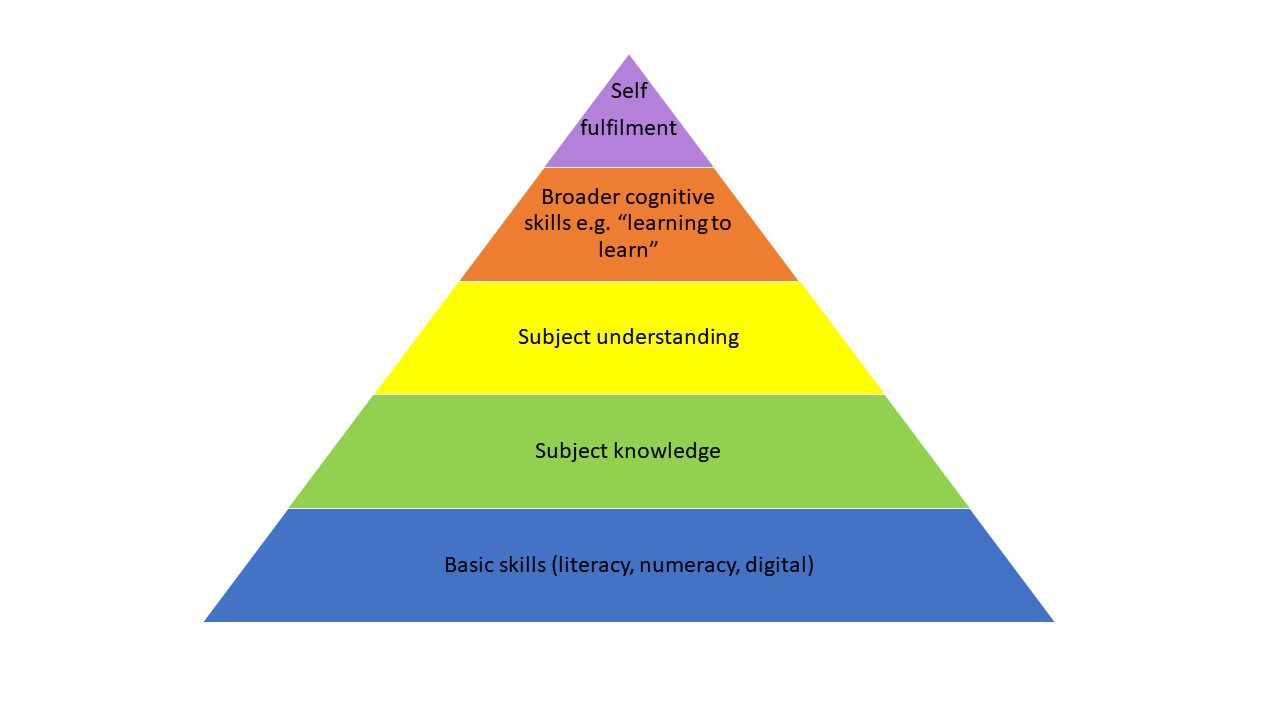At times it can seem as if the debate over the purpose of higher education is trapped in a struggle between the philistines and the idealists.
On the one hand, the philistines are pilloried for having a narrow focus on facts and employment-related skills, disregarding the benefits that can be gained from broader cognitive skills, a love of learning and self-fulfilment. On the other, the idealists are condemned as starry-eyed dreamers, wanting to turn out graduates who can contemplate their place in the universe but not hold down a basic job. The truth, as always, is more complex.
Rather than being in competition, I would propose that these different purposes instead stand in a hierarchy in relation to themselves, a hierarchy that has similarities in conception to Maslow’s hierarchy of needs. Higher education has many different purposes and all have value. The idealists are correct in that the upper levels represent the highest levels of achievement, but the philistines are correct that, without achieving the lower levels, the value of the upper levels by themselves is fundamentally called into question.
A potential conception of the hierarchy is as below:

What do we mean by a hierarchy?
The word hierarchy has a number of connotations. As with Maslow, through the broad shape of the hierarchy is clear, one can debate the precise level at which many individual purposes should sit. Is digital a core skill or subject knowledge? How distinct are subject understanding and wider cognitive skills? Such ambiguities to not undermine the fundamental conception of the model.
More importantly, by hierarchy it is not meant that an individual’s learning must progress up the pyramid in strict order, save in the most trivial sense that it helps to be able to read to study history. In many cases, skills at all levels of the hierarchy may be developed simultaneously. Furthermore, there may be some individual students who place a different weighting upon the different levels, just as has been found to be the case in Maslow’s hierarchy.
Where the hierarchy has the strongest relevance is in terms of institutions and courses, as well as their interaction with students and the wider world. To earn its position in teaching the higher levels of the hierarchy, an institution must first demonstrate that it is also able to effectively teach the lower. This is for two reasons:
- The higher levels are both more difficult and challenging to teach, as well as harder and more abstract to measure. It is simply not credible that an institute is excelling at imbuing self-actualisation and broader cognitive skills if it is demonstrably failing to teach cose skills and basic subject knowledge.
- With a few exceptions, the wider world expects certain qualities of a graduate. Higher Education is called ‘higher’ for a reason – because it presumes the more fundamental skills have been covered. Regardless of the higher skills they may possess, few employers will want a graduate who is not functionally literate or numerate.
Failing at the first hurdle
Unfortunately, while most of the university system is high quality, far too many graduates are failing to achieve even the lowest level of the hierarchy. A recent survey found that 25% of employers needed to provide remedial training in functional skills for graduate recruits, while the OECD found that 7% are lacking basic skills in English and maths. To emphasise what this means: 7% of graduates don’t have the English and maths skills that we expect of a 14-year-old.
In a further report published last week, the OECD found that “graduates who say that they are overqualified for their job have numeracy skills that are well below other graduates who find work that matches their level of education.” Andreas Schleicher, the OECD’s director for education and skills, has said, “Many universities in the UK are doing a fantastic job, but there are some [that are providing] programmes that probably shouldn’t be there.”
Some might say that it is not the place of universities to teach these skills. However, with entry barriers to HE all but eliminated, providers must take responsibility for raising the skills of those they admit. There is nothing fundamentally wrong with taking students with high potential and then running remedial classes or foundation years to address this – done well, this can be a powerful enabler of social mobility. But taking students without basic skills, and then awarding them degrees three years later, still lacking functional literacy and numeracy, is inexcusable.
A basic skills test for graduates
It is clear that one can no longer have confidence that a UK graduate has basic skills in English and maths. If this situation is allowed to persist, it may fundamentally undermine the reputation of UK higher education – despite the high quality that exists in much of the system.
I have written before that it is questionable as to why courses in which fewer than 50% of graduates progress to highly skilled jobs should be eligible for student funding. However, a simpler solution would be to make receipt of a bachelor’s degree conditional upon passing a simple, standardised test in English and maths, in addition to the current requirements set by the institution. This could be modelled on those already in use for teacher training and set at the level expected by GCSE. The test would be pass or fail, to prevent students well above this standard seeking to maximise their score.
Some will argue that such a test is unnecessary or in some way demeaning. This is demonstrably untrue – even if set at Year 9 level, 7% of graduates would fail; at GCSE level, we can presume the number would be higher. It is not demeaning to put in place a test that is clearly needed. Unlike the standardised exams proposed by Reform, such a test would not interfere with the diversity of courses offered across institutions – it would simply provide assurance that all students met a basic standard, that a graduate with a Level 6 qualification has Level 3 standard literacy and numeracy.
This reform could be introduced via the student finance system. While institutions with degree-awarding powers could continue to award degrees as they saw fit, only students at institutions which agreed to comply with this requirement would be eligible for student finance support. In addition to the individual requirement to pass to receive a degree, institutions or courses with a high failure rate on the test could also see their eligibility for student finance support withdrawn.
In short, while HE institutions serve a range of purposes, it is only by clearly delivering on those lower in the hierarchy that they can have credibility at their claims to be fulfilling the rest. With too many graduates failing to achieve basic levels of English and maths, adding a basic national skills test to the conditions for graduation would help restore confidence in the value of a UK degree, while supporting universities in their mission to deliver higher learning.












